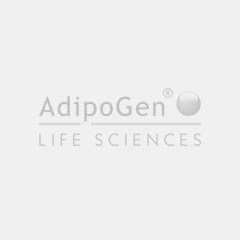Cookie Policy: This site uses cookies to improve your experience. You can find out more about our use of cookies in our Privacy Policy. By continuing to browse this site you agree to our use of cookies.
BellBrook
Transcreener ADP2 FI Assay

| Product Details | |
|---|---|
| Product Type | Kit |
| Properties | |
| Application Set | Compound Screening |
| Crossreactivity | All |
| Quantity |
200 assays/96wells (BBL-3013-A) 1000 assays/384wells (BBL-3013-1K) 10000 assays/384wells (BBL-3013-10K) Note: The exact number of assays depends on enzyme reaction conditions. |
| Sensitivity | Excellent data quality (Z’ ≥ 0.7) at low substrate conversion (typically 10%). |
| Range | Accommodates ATP concentrations ranging from 0.1 μM to 1,000 μM. |
| Detection Type | Fluorescence intensity |
| Kit Contains |
ADP2 Antibody-IRDye® QC-1, ADP Alexa Fluor®594 Tracer, Stop & Detect Buffer B, 10X, ATP, ADP Note: The plates are not included, please see manual for material not provided but necessary for assay. |
| Other Product Data |
Click here for Complete Information from the Original Manufacturer
Easy-to-Use (mix-and-read method).Simple homogenous biochemical assay. Direct detection of ADP eliminates laborious coupling steps. Non-radioactive, safe assay method. HTS Compatible with 96, 384, and 1536-well plates. Sensitive, robust detection of ADP. This means up to 10X less enzyme, a significant cost reduction on large screens. |
| Declaration | Manufactured by BellBrook Labs. |
| Shipping and Handling | |
| Shipping | DRY ICE |
| Short Term Storage | -20°C |
| Long Term Storage | -20°C |
| Handling Advice | Avoid freeze/thaw cycles. |
| Documents | |
| Manual |
 Download PDF Download PDF |
| Product Specification Sheet | |
| Datasheet |
 Download PDF Download PDF |
The Transcreener® HTS Assay platform overcomes the need for time-consuming, one-off assay development for individual members within a group transfer enzyme family by utilizing a single set of assay reagents that detect an invariant product. The generic nature of the Transcreener® HTS Assay platform eliminates delays involved in assay development for new HTS targets, and greatly simplifies compound and inhibitor profiling across multiple target families. Transcreener assays have been validated with major HTS instruments to determine the optimal filters and settings for maximal assay performance. Application notes with all important details are available.
The Transcreener ADP2 assay is available in three fluorescent readouts, Fluorescence polarization (FP), Fluorescence intensity (FI) and Time-resolved Forster-resonance-energy-transfer (TR-FRET), which provide a safe HTS-compatible alternative to cumbersome radioassay methods and are more sensitive and less subject to interference than other detection methods. All readouts use far-red tracers to minimize compound interference and lower false-positive rates.
The Transcreener® ADP2 FI Assay (Prod. No. BBL-3013) is a red, competitive fluorescence intensity (FI) assay based on the detection of ADP and therefore is compatible with any enzyme class that produces ADP, including protein, lipid, and carbohydrate kinases, ATPases, DNA helicases, carboxylases and glutamine synthetase. The Transcreener® ADP2 Assay is a simple one step homogenous detection assay, and is flexible with regard to ATP concentration (0.1 to 100 μM ATP). The assay provides excellent signal at low substrate conversion, with a Z’ = 0.7 at 2.5% ATP conversion using 1 μM ATP.
- Primuline derivatives that mimic RNA to stimulate hepatitis C virus NS3 helicase-catalyzed ATP hydrolysis: N.L. Sweeney, et al.; J. Biol. Chem. 288, 19949 (2013)
- A High-Throughput Method for Measuring Drug Residence Time Using the Transcreener ADP Assay: M. Kumar & R.G. Lowery; LSAS Discov. 22, 915 (2017)
- A High-Throughput Screening Triage Workflow to Authenticate a Novel Series of PFKFB3 Inhibitors: S.A. St-Gallay, et al.; SLAS Discovery 23, 11 (2018)
- Characterization of the Golgi c10orf76-PI4KB complex, and its necessity for Golgi PI4P levels and enterovirus replication: J.A. McPhail, et al.; EMBO Rep. e48441 (2019)








